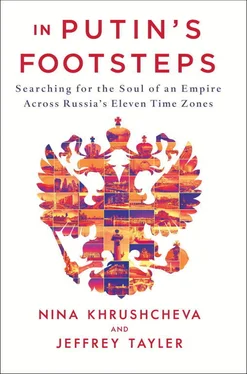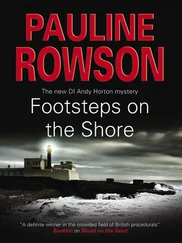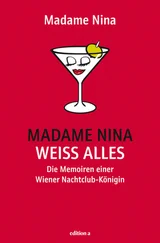“ Krym nash ,” the typical Russian response to any militant or oppressive move by the Kremlin, we saw as a display of feelings of insecurity and superiority all at once. Again, think of the double-headed eagle, the split-personality syndrome.
This newly revived fear of foreign associations—somewhat odd in an exclave so proud of its Western heritage—may well have been shared by one of our potential contacts, Andrei Klemeshev, the rector of the Immanuel Kant Baltic Federal University. Despite our repeated attempts to arrange an interview for this book, he avoided meeting us. We did not expect this: after all, his university was once the open-minded Albertina (as the University of Königsberg was formerly known), where Kant himself served as rector and taught logic and metaphysics; it was also the alma mater of Hoffmann and the birthplace of German Romanticism. Cordial on the phone at first, Klemeshev soon stopped answering our calls and ignored our texts. In a militarized city on the border, he might have decided that meeting with us would create problems for him with the authorities. This was a reasonable, if a slightly paranoid, supposition: after all, we—one of us an American, the other a Russian critic of Putin living in New York—might have served to incriminate him by mere association. His response reflected the increasing animosity between Russia and the West and was reminiscent of suspicions that made Russians wary of entertaining Westerners during the Cold War era. Others in Kaliningrad, too—including the head of the German Relations Center—refused to see us, citing busy schedules or forthcoming trips.
Our difficulties in arranging meetings put us in mind of a scene from Russian literature. In Mikhail Bulgakov’s novel The Master and Margarita —which for so many Russians was, during the atheist decades of communism, a Soviet gospel of sorts—a theater administrator, Varenukha, dodged phone calls from those hoping to secure tickets to a scandalous show featuring Satan (the character Woland, in Bulgakov’s telling). Spoofing Goethe’s Faust and Kant’s The Critique of Pure Reason , Bulgakov, writing in the Stalin era, depicted Woland as surveilling Muscovites en masse. Perhaps Klemeshev, too, thought he was being watched, and that we had come to town to ask him probing, even judgmental, questions.
One person, though, did agree to meet with us—Igor Rudnikov, a deputy of the Kaliningrad City Council and the editor of the popular opposition newspaper Novye Kolesa (New Wheels). (He would pay dearly for his political views; in November 2017 he was arrested on trumped-up charges of extortion.)
On an afternoon of rain and whipping wind we found him in his office in a nondescript suburb, which, like so much of Kaliningrad, resembled a construction site. A balding, trim bespectacled man in his early fifties, Rudnikov seemed excited. He had just returned from a court case that pitted him and his clients against a “criminal businessman” who wanted to build a fourteen-story hotel without the requisite permits. There had been two murders in Kaliningrad recently, he explained, but “The police are on the side of killers, of course.”
Rudnikov was eager to talk to an American. In him, as in others we would encounter on our travels, Westerners—especially Americans—still inspire reverence and often receive preferential treatment, despite the xenophobic attitude of the authorities. The Soviet Union was largely closed to foreigners, and curiosity is still evident in now rather common encounters. Moreover, Russia has felt inferior and envious toward the West throughout its history, hence its often-militant display of grandstanding and superiority in human relations translates as fascination and desire for contact.
Receiving the American’s attention, for an hour and a half, Rudnikov lectured us on Russian politics: “For a century, our country has been in the grip of total lies.” As had the border guards at the airport, he treated Nina as Jeff’s helper–a reflection of sexist bias still so common in Russia. Sure, women write books in Russia all the time, but a male foreigner is in any case worthier of serious attention than a Russian female. (We did not advertise Nina’s Khrushchev connection.)
Rudnikov was particularly concerned about the vulnerability of an American writer traveling around Russia, believing that such an American would inevitably provoke suspicion. “Yesterday you Americans were our friends. Today, you aren’t, and no one will want to talk to you. The way it is nowadays,” he added, channeling the state’s message, “if you explain you’re writing a book, you’ll be immediately considered a spy, a provocateur. You have to come up with a better cover.”
Cover? The odd, very Cold War choice of words made us doubt what he was saying. The expressions on our faces surely reflected this, possibly prompting him to clarify: “But here in Kaliningrad it’s different, of course. Europe is a stone’s throw away. Here we see Russian patriots only at soccer matches.”
This was not quite our impression. Rudnikov was a member of the opposition, after all, but as it turned out, he had it wrong. In places we were to visit farther east, which we expected to be more nationalist and patriotic, people were, in fact, much less suspicious than in Kaliningrad.
We told him of our travails in attempting to interview people in town. He offered an explanation that contradicted what he had just said. In his view, what made some in Kaliningrad so closed-minded, was the oblast’s proximity to the West and, therefore, at least as the authorities saw it, the distinct possibility that Kaliningrad might succumb to Western influence.
Rudnikov told us that in the early 2000s Kaliningrad was proud that Putin’s then-wife Lyudmila hailed from here.
“Putin was no stranger to this town,” he said. “What’s more, for the first two terms of his presidency, Kaliningrad was supposed to become Russia’s European enclave, a qualitative test for Russo-European relationships that would then be replicated in the rest of the country.” In fact, he explained, in 2005 Königsberg/Kaliningrad celebrated its 750th anniversary as a joint German-Russian city. This reflected a dramatic change in the authorities’ attitude toward Kaliningrad’s history, which they had previously depicted as beginning, basically, only in 1945. Germany welcomed the inclusive continuity of the “new” view of the city’s past; German tourists whose families were originally from the area could now visit without feeling burdened by the Nazis’ crimes in the Soviet Union. The government then proclaimed Kaliningrad a Free Economic Zone (appropriately nicknamed Yantar , or Amber) and dubbed it Russia’s Hong Kong, with tax tariffs lower than elsewhere in the country. Rudnikov detailed for us the inevitable distortions to which such status led: clever entrepreneurs imported goods—from foodstuffs to automobiles—from Germany and other European countries only to repackage and relabel them “Made in Kaliningrad,” so that they might sell them as authentically Russian.
Kaliningrad’s pro-Western orientation, however, began to change in 2002, when President George W. Bush announced that the United States was unilaterally withdrawing from the Anti-Ballistic Missile Treaty (a cornerstone arms control agreement of the Cold War) it had signed with the Soviet Union. He further decided to deploy missile defense systems (supposedly against threats emanating from Iran) in Poland and other Eastern European countries. Relations soured further after the Russian annexation of Crimea and the subsequent imposition of Western economic sanctions on the Russian economy. Kaliningrad set about converting itself into a fortress of sorts, in preparation for conflict with the NATO alliance. Russia accomplished this easily; after all, it had never fully dismantled the oblast’s military infrastructure and continued sheltering its Baltic fleet there. In addition to basing Iskander missiles in the oblast, which became official in 2018, it has recently set about building long-range anti-missile radar installations.
Читать дальше












